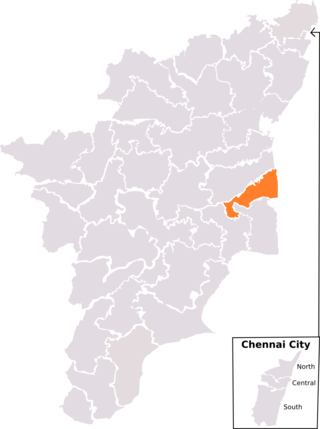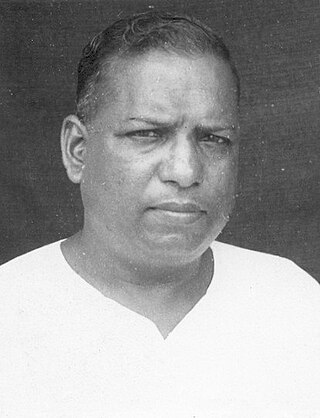Related Research Articles

The Rajya Sabha,constitutionally the Council of States,is the upper house of the bicameral Parliament of India. As of 2022,it has a maximum membership of 245,of which 233 are elected by the legislatures of the states and union territories using single transferable votes through open ballots,while the president can appoint 12 members for their contributions to art,literature,science,and social services. The potential seating capacity of the Rajya Sabha is 245,according to article 80 of the Indian Constitution. Members sit for staggered terms lasting six years,with about a third of the 238 designates up for election every two years,in even-numbered years. Unlike the Lok Sabha,the Rajya Sabha is a continuing chamber and hence not subject to dissolution. However,the Rajya Sabha,like the Lok Sabha,can be prorogued by the president.

The Lok Sabha,constitutionally the House of the People,is the lower house of India's bicameral Parliament,with the upper house being the Rajya Sabha. Members of the Lok Sabha are elected by an adult universal suffrage and a first-past-the-post system to represent their respective constituencies,and they hold their seats for five years or until the body is dissolved by the President on the advice of the council of ministers. The house meets in the Lok Sabha Chambers of the Sansad Bhavan,New Delhi.

The Parliament of India is the supreme legislative body of the Republic of India. It is a bicameral legislature composed of the president of India and two houses:the Rajya Sabha and the Lok Sabha. The president in his role as head of the legislature has full powers to summon and prorogue either house of Parliament or to dissolve the Lok Sabha. The president can exercise these powers only upon the advice of the prime minister and his Union Council of Ministers.

The Government of India,known as the Union Government or Central Government but often simply as the Centre,is the national government of the Republic of India,a federal democracy located in South Asia,consisting of 28 union states and eight union territories. Under the Constitution,there are three primary branches of government:the legislative,the executive and the judiciary,whose powers are vested in a bicameral Parliament,President,aided by the Council of Ministers,and the Supreme Court respectively. Through judicial evolution,the Parliament has lost its sovereignty as its amendments to the Constitution are subject to judicial intervention. Judicial appointments in India are unique in that the executive or legislature have negligible say.
The Union Council of Ministers is the principal executive organ of the Government of India,which functions as the senior decision making body of the executive branch. It is chaired by the prime minister and consists of the heads of each of the executive government ministries. Currently,the council is headed by prime minister Narendra Modi and consists of 29 members,including the prime minister. The council is subject to the Parliament of India.

The 14th Lok Sabha was convened after the 2004 Indian general election held in four phases during 20 April –10 May 2004,which led to the formation of first Manmohan Singh ministry (2004–2009). Indian National Congress-led United Progressive Alliance won 62 more seats than previous 13th Lok Sabha. The Lok Sabha is the lower house in the Parliament of India. 8 sitting members from Rajya Sabha,the Upper House of Indian Parliament,were elected to 14th Lok Sabha after the 2004 Indian general election.
India has a parliamentary system as defined by its constitution,with power distributed between the central government and the states.

A Member of the Legislative Assembly (MLA) is a representative elected by the voters of an electoral district (constituency) to the legislature of State government in the Indian system of government. From each constituency,the people elect one representative who then becomes a member of the Legislative Assembly (MLA). Each state has between seven and nine MLAs for every Member of Parliament (MP) that it has in the Lok Sabha,the lower house of India's bicameral parliament. There are also members in three unicameral legislatures in Union Territories:the Delhi Legislative Assembly,Jammu and Kashmir Legislative Assembly and the Puducherry Legislative Assembly. Only a Member of the Legislative Assembly can work as a minister for more than 6 months. If a non-Member of the Legislative Assembly becomes a Chief Minister or a minister,he must become an MLA within 6 months to continue in the job. Only a Member of the Legislative Assembly can become a Speaker of the Legislature.

Kamal Nath is an Indian politician who served as the 18th Chief Minister of Madhya Pradesh for approximately 15 months and resigned after a political crisis. He was the Leader of the Opposition in the Madhya Pradesh Legislative Assembly from March 2020 to April 2022.

Sushma Swaraj was an Indian lawyer,politician,and diplomat who served as the Minister of External Affairs of India in the first Narendra Modi government from 2014 to 2019. She is only the second person to complete the 5-year term as Minister of External Affairs after Jawaharlal Nehru. Being a senior leader of Bharatiya Janata Party,she was the second woman to hold the office,after Indira Gandhi. She was elected seven times as a Member of Parliament and three times as a Member of the Legislative Assembly. At the age of 25 in 1977,she became the youngest cabinet minister of the Indian state of Haryana. She also served as 5th Chief Minister of Delhi for a short duration in 1998 and became the first female Chief Minister of Delhi.

General elections were held in India in April–May 1996 to elect the members of the 11th Lok Sabha. The result of the election was a hung parliament,which would see three Prime Ministers in two years and force the country back to the polls in 1998. Atal Bihari Vajpayee of Bharatiya Janata Party,the single largest party to win this election,winning 67 more seats than previous 10th Lok Sabha,formed the government which lasted for only 13 days.

Mayiladuthurai is a Lok Sabha constituency in Tamil Nadu. Its Tamil Nadu Parliamentary Constituency number is 28 of 39. It spreads on two districts,Mayiladuthurai and Thanjavur.

Members of the 16th Lok Sabha were elected during the 2014 Indian general election. The elections were conducted in 9 phases from 7 April 2014 to 12 May 2014 by the Election Commission of India. The results of the election were declared on 16 May 2014.

A Member of Parliament in the Lok Sabha is the representative of a legislative constituency in the Lok Sabha;the lower house of the Parliament of India. Members of parliament of Lok Sabha are chosen by direct elections on the basis of the adult suffrage. The maximum permitted strength of members of parliament in the Lok Sabha is 550. This includes the maximum 530 members to represent the constituencies and states and up to 20 members to represent the union territories. Between 1952 and 2020,two seats were reserved for members of the Anglo-Indian community. The current elected strength of the Lok Sabha is 543. The party—or coalition of parties—having a majority in the Lok Sabha chooses the Prime Minister of India.
Rudrasen Chaudhary is an Indian politician. He was elected to the Lok Sabha,the lower house of the Parliament of India as a member of the Bharatiya Janata Party.
Amrit Lal Bharti is an Indian politician. He was elected to the Lok Sabha the lower house of Indian Parliament from Chail in Uttar Pradesh as a member of the Bharatiya Janata Party.

Mohan Nayak was an Indian politician. He was elected to the Lok Sabha,the lower house of the Parliament of India as a member of the Indian National Congress.
References
- ↑ "Lok Sabha Debates". Indian Kanoon. Retrieved 26 April 2020.
- ↑ Parliament of India, the Fourteenth Lok Sabha, 2004-2009: A Study. Lok Sabha Secretariat. 2010. p. 147. Retrieved 26 April 2020.
- ↑ Shailendra Kumar Chaturvedi (1981). The Seventh Lok Sabha Election: An Analysis of Peoples' Verdict. Grantham. p. 150. Retrieved 26 April 2020.